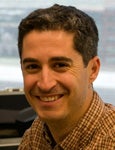Trio of CU biomed scientists named Boettcher Investigators
Three University of Colorado researchers have been named to the 2012 class of Boettcher Investigators in the Webb-Waring Biomedical Research Program. This is the third year for the program, which supports early career scientists in their work toward making discoveries that improve human health.
This year’s Boettcher Investigators, all from CU, are:
| Harald Junge, Ph.D., assistant professor of Molecular, Cellular and Developmental Biology at the University of Colorado Boulder, who researches retinal vascular development and disease | |
| Matthew Kennedy, Ph.D., assistant professor of Pharmacology, University of Colorado School of Medicine, who researches molecular mechanisms of Alzheimer’s pathology | |
| Chad G. Pearson, Ph.D., assistant professor of Cell and Developmental Biology at the University of Colorado School of Medicine, who researches organization of the microtubule cytoskeleton for cell division and signaling |
"The Boettcher Foundation Board is very pleased to further the research of early career investigators,” said Edward D. “Ted” White III, chairman of the Boettcher Foundation Board of Trustees, who made the announcement on Friday. “Our support enables these junior investigators to continue their valuable research and to compete in the future for major grants. It’s hard to believe that we’re already in the third year of this effective program.”
The Webb-Waring Biomedical Research program fills an unmet need in the state by assisting early career investigators engaged in biomedical sciences to advance their research. The program also honors the tradition of Colorado's Webb and Waring families by investing in science that has the possibility of making significant contributions to human health.
"Through this program, the Boettcher Foundation has been able to bring resources to an area where funds are currently lacking and where federal and private research programs provide limited support,” said Timothy W. Schultz, president and executive director of the Boettcher Foundation. “Early career investigators quite frequently have a difficult time securing a first opportunity at an independent research effort that will move them out of the laboratory of their mentors and onto their own new and exciting areas of discovery."
Junge’s lab studies retinal blood vessels using mice as model system. By focusing on understanding molecular processes that instruct the development and function of the retinal vasculature, Junge aims to further understand the role of these molecular processes in causing blinding diseases. For example, the neovascular form of age-related macular degeneration (AMD) and diabetic retinopathy (DR) are leading causes of blindness. Both diseases critically involve pathological changes in the retinal vasculature and highlight the need to understand the biology of this important structure.
The Kennedy lab studies how connections between neurons in the brain known as synapses are changed through learning, a process known as synaptic plasticity. This fundamental process is required for normal cognition and goes awry in diseases and disorders including autism, addiction and Alzheimer’s. Clarifying the mechanisms of plasticity will be key to understanding how memory is ravaged by disease, and to begin developing effective therapies to prevent the cognitive decline associated with many neurological disorders. Most recently, the Kennedy lab is studying how one of the potent neurotoxic agents responsible for Alzheimer’s triggers the loss of synapses and leads to neuronal cell death.
Pearson’s lab studies how cellular polymers called microtubules are organized to divide cells, to support intercellular communication and to move mucus. Disruption of these important events contributes to cancer, developmental and neurological anomalies, and respiratory illness. Pearson’s research is dedicated to understanding how genetic perturbations lead to these devastating illnesses.
With the addition of the 2012 Class, there are now 14 Boettcher Investigators conducting research at CU and three other Colorado institutions: Colorado State University, National Jewish Health and Colorado School of Mines.
Individual grant amounts for these research projects range from $200,000 to $300,000. The grant amounts vary based on funding allocated to each institution.
Early Career Investigators (ECIs) are faculty members who are four years or less from their first academic appointment at a research institution. The grants awarded by the Webb-Waring Biomedical Research Program support the work of promising ECIs in Colorado. Eligible investigators apply through a competitive process within their respective institutions.
Boettcher Foundation announced the creation of the program in 2008, as the result of an innovative agreement between the Boettcher Foundation, the Webb-Waring Foundation for Biomedical Research and the University of Colorado. Through the program, Boettcher Foundation now invests more than $1 million each year into efforts to increase Colorado's competitiveness in biomedical science.
"We've made every effort to ensure that the legacies of the Webb and Waring families live on in the discovery of new knowledge to improve human health and in the advancement of young scientists," Schultz said. “The Boettcher Foundation wanted the Webb-Waring Biomedical Research Program to invest where the impact would be the most substantial. To fund excellence in people, to partner with the state’s research institutions and to further the Webb and Waring families’ long tradition of commitment to science and human health.”




